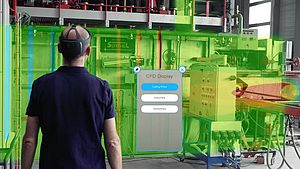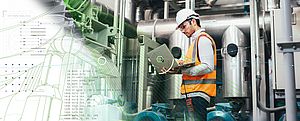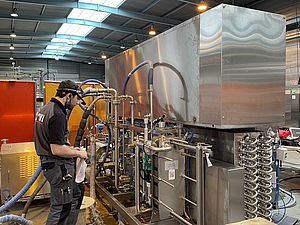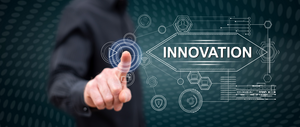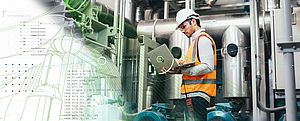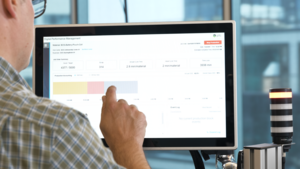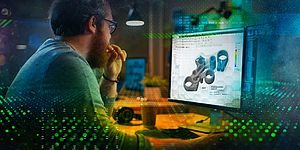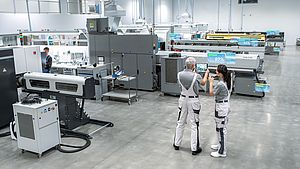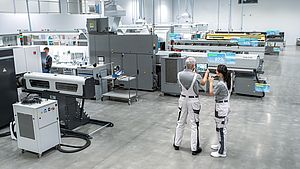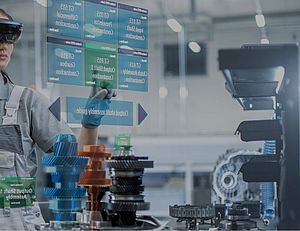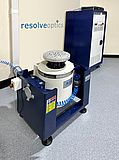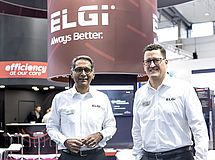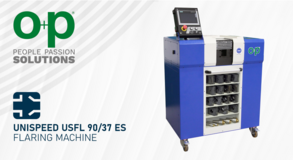Interview number 1 of our virtual round table: Michael Campbell, EVP &GM for Augmented Reality at PTC
How is your company tackling Covid-19 emergency?
M. Campbell, PTC: PTC was very well suited to support customers working in remote environments or in difficult conditions. Thanks to our good foundations, we haven’t had to ''react'' and build new tools, but we simply removed some friction, making our existing offering easily accessible to those that need it. We made some of our software available for free during the pandemic, and were very flexible with licensing options for those that needed to access software from home. And since many of our Augmented Reality (AR) tools have been developed and deployed in a Software as a service (SaaS) fashion, we can ensure availability, accessibility, and continuity of our valuable technology that is meaningful in a crisis situation. Our offerings can help with the challenges of the pandemic such as not being able to travel and meet to share knowledge and information.
How much has this crisis impacted / will impact on your business?
M. Campbell, PTC: I think it’s too early to tell. But we are a software company, so we work mostly on computers and we take advantage of Zoom and Microsoft Teams to do our work. At PTC, we are working as hard as before – if not even harder than ever. We are all continuing to do the good work and execute on our strategy. Certainly, there are challenges. For example, we had to move our week-long annual industry event to a one-day virtual show and our sales motion had to change as well. Normally we spend a lot of time with customers, validating our technology and the value that we can deliver. Now we had to change the way we do that, taking advantage of digital tools, including our own technology, like Vuforia Chalk. We do workshops with our customers to help them learn how to use our software and we use Vuforia Chalk to train them on the use of specific hardware as part of our selling motion. Another example is that our AR business works as a combination of the physical and the digital worlds, so in order to demonstrate and use AR it’s necessary to be in a physical location. This had to change, too, so everything has moved online. In some ways, there have been some advantages in terms of equalizing the way that we communicate.
How do you think this crisis will impact how the industrial sector works in the future?
M. Campbell, PTC: I cannot imagine that the world will go back 100% to the way we used to work. But even if we do, now everybody has an inherent understanding of what could happen. Companies that survive this crisis will want to be prepared. For many customers, this crisis is shining a light on the importance of having SaaS deployable software and finding new ways to share knowledge even working from home. This served as a wake-up call, warning that things need to be different. We cannot be unprepared if this happens again. Our strategy is to deeply embrace Software as a Service and this will strengthen our commitment to ensuring that all our offerings are fully available to our customers in similar situations in the future. We are also working on the improvement of our digital tools. Let’s take Vuforia Chalk, for example. When you increase the visibility of a product and there are many more people using it, you get additional insights to what they would like to do with it. So, our R&D team is working harder than ever to improve our products in light of the data collected. But we are not trying to catch up, as we already have technologies like Vuforia Chalk and Vuforia Expert Capture. We are building and innovating on the foundation that we already have.
How would you fill the gap of industrial events for lead generations and networking in this moment?
M. Campbell, PTC: Many events moved to virtual and companies are taking advantage of the web and the webcasting. In some cases, we’re seeing record attendance at virtual events, maybe because people have more time to engage since they’re not commuting or traveling for business. We are looking forward to engaging with over 7,000 virtual attendees at LiveWorx on June 9. But SaaS technology is the real boost now, as the idea that it can be quickly available and just run on your machines, whatever you have, is marking a new way to produce and engage with people. We feel that it’s also essential to push the educational use of our technology right now. Educators are struggling to engage students and Augmented Reality offers another way to present digital content, which can then be personalized in a physical location. The way we communicate is changing and PTC technology has the potential to have a significant impact also going forward.
What products and/or services are you offering customers that can assist in the current situation & alleviate impact?
M. Campbell, PTC: At PTC we feel we are quite well positioned to respond to the changing market needs, especially as we increasingly focus on delivering Software as a Service. That’s a key tenet of our Augmented Reality and Onshape SaaS CAD offerings. Business continuity is another important concept. Many people now have problems accessing their VPN or running software on their computers. With a SaaS solution, this is not a problem at all. We embrace mobility. We embrace the idea that you should be able to work anywhere you are. That’s one PTC advantage. Another key advantage is that we have been working on transferring knowledge digitally in our AR strategy for years. We had been doing that to help customers with their concerns around an aging and retiring workforce and their challenges with traditional training methods. But the coronavirus has really changed the way people work, with travel bans and social distancing. Companies still need to maintain critical infrastructure and critical systems in their factories.
They still need to work physically. We have the luxury of using WebEx and sharing digital content on our laptop screens, but that isn’t possible for a frontline worker. Augmented Reality really has the potential to make a profound impact, especially during this crisis. One of the things that we have done is to leverage the power of our Vuforia Chalk Augmented reality (AR) offering for remote support and collaboration. Vuforia Chalk is a sort of superpowered FaceTime for video calls where you sign up and invite others in your company. Everybody then downloads a mobile app on their device or just uses a web browser, allowing them to connect with one another, share voice and video streams, and draw right on the screen, creating annotations that stick to the real-world environment to simplify communication.
We have made the complete commercial offering available for free to anybody that needs it. We began at the end of March and we have seen a dramatic increase in the call volume on average. Some are our commercial customers, but many are new companies that have heard about this offer and signed up with their teams to take advantage of the technology. Nearly 10,000 individuals from various industries have expressed an interest in using Vuforia Chalk. It’s been a remarkable uptake and we are proud that our technology adds value in these times where there are still many challenges and uncertainties.
Sara Ibrahim




